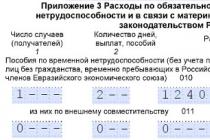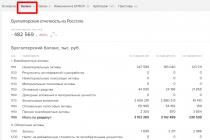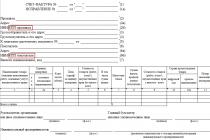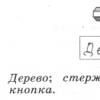The relationship between the tenant and the lessor is governed by the property lease agreement. According to Art. 614 of the Civil Code of the Russian Federation (hereinafter referred to as the Civil Code of the Russian Federation), the tenant is obliged to promptly pay fees for the use of property (rent). The procedure, conditions and terms for paying rent are determined by the lease agreement. It also establishes various guarantees for the parties' compliance with their obligations under the contract and the procedure for using these guarantees.
The procedure for recording a security payment under a lease agreement in accounting depends on the form of security for the fulfillment of obligations it relates to.
According to paragraph 1 of Art. 329 of the Civil Code of the Russian Federation, the fulfillment of obligations can be ensured by a penalty, a pledge, retention of the debtor’s property, a surety, a bank guarantee, a deposit and other methods provided for by law or contract.
In this situation, the security deposit is collateral.
By virtue of the pledge, the creditor under the obligation secured by the pledge (pledgee) has the right, in the event of failure of the debtor to fulfill this obligation, to receive satisfaction from the value of the pledged property preferentially before other creditors of the person who owns this property (the pledgor), with exceptions established by law. In cases and in the manner established by law, satisfaction of the creditor's claim on the obligation secured by the pledge (pledgee) can be carried out by transferring the subject of the pledge into the ownership of the pledgee (Article 334 of the Civil Code of the Russian Federation).
Accounting
In this case, the security payment performs only a security function and is subject to return to the tenant. Therefore, the amount of the security deposit is a means temporarily held by the lessor. Consequently, the amount of the security payment received cannot be recognized as the income of the lessor (clauses 3, 12 of the Accounting Regulations “Income of the Organization” PBU 9/99, approved by Order of the Ministry of Finance of Russia dated May 6, 1999 N 32n).
The amount of the security payment received is reflected in accounting as accounts payable on the credit of account 76 “Settlements with various debtors and creditors”, in correspondence with the debit of account 51 “Settlement accounts” (clause 12 of PBU 9/99, Instructions for the use of the Chart of Accounts financial and economic activities of organizations, approved by Order of the Ministry of Finance of Russia dated October 31, 2000 N 94n).
The return of the amount of the security deposit upon expiration of the lease agreement is reflected in the accounting records by a reverse entry to the specified accounts.
VAT
According to the position of the Ministry of Finance of Russia, payment of the amount of the security deposit is associated with payment for rental services sold, therefore, it falls under paragraphs. 2 p. 1 art. 162 of the Tax Code of the Russian Federation and is subject to VAT by the lessor upon receipt (Letters of the Ministry of Finance of Russia dated 09/21/2009 N 03-07-11/238, dated 03/06/2009 N 03-07-11/54, dated 05/12/2008 N 03-07-11 /182, dated September 17, 2009 N 03-07-11/231).
However, there is judicial practice according to which the amounts of the security payment (deposit) do not increase the VAT tax base. For example, the Resolution of the Federal Antimonopoly Service of the Moscow District dated October 14, 2011 in case No. A40-151888/10-129-621, in which the court indicated that the security deposit, by its legal nature, is a guarantee of the tenant’s fulfillment of obligations under the contract and its payment is not related to payment for services. This means that these amounts should not be included in the VAT tax base.
If, according to the terms of the agreement, the security payment is also an advance payment (against future payments), then such a payment cannot be considered as a pledge. In this regard, the received amounts of the security payment must be included in the VAT tax base.
It must be taken into account that if the amount of the security deposit (deposit) is not included in the VAT tax base, you may have to defend your position in court.
Income tax
Receipt of a security payment as collateral under a lease agreement is not recognized as income for profit tax purposes, regardless of which method - accrual or cash - is used by the party who received it (clause 2, clause 1, article 251 of the Tax Code of the Russian Federation).
Accounting records
Amounts of the security deposit are not included in the VAT tax base
The amounts of the security payment are included in the VAT tax base
The material presented in this article is provided for informational purposes only and may not be applicable to your particular situation and should not be taken as a guarantee of future results. For solutions to specific questions, we recommend contacting our company’s specialists.
We draw attention to the need to take into account changes in legislation that occurred after the date of preparation of the material.
A security deposit in a lease agreement is intended to compensate the lessor for losses incurred if the lessee fails to fulfill its obligations under the lease agreement. Let's look at the features of this payment.
The role of collateral in contractual relations
Contractual relations are interactions that involve mutual obligations and are therefore based on certain risks for the parties. To reduce such risks, the legislation provides for the possibility of introducing measures that, at least to some extent, could reduce losses from these risks. Such measures are called interim measures and can be presented (Article 329 of the Civil Code of the Russian Federation):
- penalty,
- collateral
- holding things
- guarantee,
- independent party guarantee
- deposit,
- security (guarantee) payment.
Security payment is a new concept for the Civil Code of the Russian Federation, introduced into it only on June 1, 2015 (Law “On Amendments...” dated March 8, 2015 No. 42-FZ). Its meaning is that the 1st party to the contract contributes in favor of the 2nd party a certain amount of money, which, if circumstances arise for the violation of monetary obligations to the 2nd party, will be counted towards their repayment (clause 1 of Article 381.1 of the Civil Code of the Russian Federation) . There may be a replacement of the funds contributed to the obligation with securities or things (Article 381.2 of the Civil Code of the Russian Federation).
If circumstances of violation of obligations do not arise during the contract, then the security payment upon its completion is usually returned to the 1st party, although by agreement of the parties it can be reclassified as a payment for another purpose. If it is partially used, the payment amount is restored to the original one. It is also possible to reduce its total amount if circumstances conducive to this are created.
Security deposit under a lease agreement - what is it?
The provision for making a security deposit in a lease agreement is quite often due to the fact that such a document:
- drawn up in relation to expensive property;
- reflects the obligation to regularly pay lease payments;
- lasts for quite a long time.
That is, a security payment in a lease agreement can solve the problems of compensation for damage:
- from the loss of property or bringing it into a condition that goes beyond the limits limiting the process of normal wear and tear;
- non-receipt, incomplete or untimely receipt of rental payments;
- the tenant's failure to comply with other terms and conditions contained in the lease agreement.
Regarding the security payment, the lease agreement should reflect:
- its specific purpose (what type of damage it is intended to cover);
- the amount of funds contributed to the security;
- order:
- making a payment,
- its use,
- replenishment for the used amount,
- size changes,
- return.
Cash is usually used as a security deposit in a lease agreement. Most often, they are intended to cover losses from late payment of rent. Therefore, the amount of such payment, as a rule, depends on the amount of payment specified in the contract for any of the rental periods: month, quarter or year. Although it is possible to set any amount of any arbitrary size.
Basic and additional contribution to the security deposit
With regard to the procedure for making the first (principal) amount of the security payment, the contract must determine:
- the period within which this must be done, and the moment from which this period begins to count;
- type of funds for payment and method of depositing them.
The time period for transferring the property to the lessee may depend on the moment of fulfillment of the obligation to provide security. Throughout the entire term of the contract, the amount of the security deposit will be kept by the lessor. No interest is charged on it.
In case of full or partial use of the funds constituting the guarantee payment, its amount must be restored by means of an additional contribution to this security.
The agreement may also provide for a change in the amount of the security deposit. For example, depending on the increase (decrease) in the monthly rent amount. In this case, the amount missing to the increased amount of security will need to be additionally transferred to the lessor, and the excess security payment can either be returned to the tenant or offset against the payment of rent.
For situations in which it is necessary to either make an additional payment or return (offset) funds, the text of the agreement will also need to make a clause about the deadlines for completing each of the necessary actions and the moment when these deadlines begin to count.
Using a guarantee payment under a lease agreement
The guarantee payment is used in 2 cases:
- to repay damage from violation of the terms of the contract caused to the lessor in situations specified in the terms of this document;
- to pay rent for the final periods of the lease agreement, which may be provided for by its terms or an additional agreement to this document.
When using funds to pay off damage, the tenant should be notified of why and to what extent the security deposit funds were used. The amount of expenses incurred must be supported by documents. The form of such notice (notification) may become an annex to the lease agreement. From the date of sending this notice (or the date of its receipt by the tenant), it is possible to calculate the period established for replenishing the principal amount of the guarantee payment. That is, it becomes important for the parties to the contract to establish a procedure for notifying the use of security funds to pay off damage.
Refund of the security deposit under the lease agreement
Options for using the amount of the guarantee deposit upon completion of the lease agreement are established by its parties. If there is no offset against final lease payments, other options may include:
- return of security in full to the tenant;
- distribution of the payment amount between the parties equally or in some other ratio;
- transfer of security rights to the lessor.
Accordingly, if there is a need for this, the choice of option must be reflected in the contract. The return operation (no matter how much it is carried out) will not entail tax consequences for either the tenant or the lessor. But the amounts remaining with the lessor will become his income, subject to income tax (USN or personal income tax).
Taxation of guarantee payment
In terms of taxation of income tax, the guarantee payment is regarded in the same way as security in the form of a pledge, a deposit (letters of the Ministry of Finance of Russia dated 05/31/2016 No. 03-03-06/1/31325, dated 02/18/2016 No. 03-03-06/1 /8968, dated November 3, 2015 No. 03-03-06/2/63360), therefore, during the term of the contract it is not considered:
- income from the lessor (subclause 2, clause 1, article 251 of the Tax Code of the Russian Federation);
- expense from the tenant (clause 32 of article 270 of the Tax Code of the Russian Federation).
Regarding the taxation of this payment with VAT, one should be guided by the norm of paragraph 1 of Art. 381.1 of the Civil Code of the Russian Federation, indicating that its transformation into funds counted as payment for rental services occurs only under certain circumstances, which may not occur. That is, until this moment, the guarantee payment is a means of security, and not a means of payment, and, accordingly, is not subject to VAT.
The Ministry of Finance’s point of view on the assessment of the security deposit for VAT
However, the Ministry of Finance of Russia adheres to a different, and different, point of view, considering that a security payment, which implies the possibility of offsetting it towards payment of rent, should be regarded as:
- Funds associated with payment for services sold under sub. 2 p. 1 art. 162 of the Tax Code of the Russian Federation (letter dated November 3, 2015 No. 03-03-06/2/63360). For this reason, a lessor working with VAT must charge tax payable on the amount of security received. With this approach, both parties to the lease agreement (if the tenant also works with this tax) will have problems with deducting the accrued VAT:
- for the tenant - since the tax accrual by the lessor under sub. 2 p. 1 art. 162 of the Tax Code of the Russian Federation does not imply issuing an invoice to the tenant (subclause 1, clause 3, article 169 of the Tax Code of the Russian Federation, clause 18 of the Rules for maintaining a sales book, approved by Decree of the Government of the Russian Federation of December 26, 2011 No. 1137);
- from the lessor - because the deduction for VAT accrued under sub. 2 p. 1 art. 162 Tax Code of the Russian Federation, art. 171 of the Tax Code of the Russian Federation does not imply.
- Advance payment subject to taxation by the lessor under sub. 2 p. 1 art. 167 of the Tax Code of the Russian Federation (letter dated August 16, 2016 No. 03-07-11/47861). In this case, an invoice is issued to the tenant (clause 1 of Article 168 of the Tax Code of the Russian Federation) and he has the right to take VAT on the advance for deduction with its subsequent restoration at the time of offset against payment for services provided (subclause 3 of clause 3 of Art. 170 of the Tax Code of the Russian Federation). The lessor, when crediting the advance payment for rent, will also take tax as deductions (clause 8 of Article 171 of the Tax Code of the Russian Federation).
Thus, there is uncertainty not only regarding the need to charge VAT on the amount of the security payment, but also in the semantic assessment of this payment for VAT purposes.
Accounting for security deposit
The security payment made is taken into account as a debt:
- accounts receivable - from the lessee (clauses 3, 16 PBU 10/99);
- creditor - from the lessor (clauses 3, 12 PBU 9/99).
For both parties to the agreement, it is shown in account 76 until it is returned or offset against rent payments.
The transactions for the transfer/return of the security deposit will be as follows:
- For the tenant:
Dt 76ob Kt 51 - when transferring payment;
Dt 51 Kt 76ob - when receiving it back.
- From the landlord:
Dt 51 Kt 76ob - upon receipt of payment;
Dt 76ob Kt 51 - upon his return,
where 76ob is a subaccount for accounting for collateral settlements.
In addition, during the period that the security is held by the lessor, both parties will reflect its amount on the balance sheet:
- on account 009 - with the tenant;
- on account 008 - with the lessor.
If the lessor regards the operation of receiving a security payment as related to the calculation of rent and entailing the need to charge VAT, then he will have the following entry:
Dt 76nds Kt 68,
where 76NDS is a subaccount for accounting for VAT calculations.
In a situation where the guarantee payment is considered as an advance payment intended for rent payments, deduction entries will appear that are the same for the tenant (if he works with VAT) and the lessor, but differ in the time of their implementation (for the tenant - when transferring the advance payment, for the lessor - at the time of offset of the advance payment for services):
Dt 68 Kt 76nds.
The tenant at the time of offset of the advance payment against the rent will restore the tax:
Dt 76nds Kt 68.
If VAT is charged by the lessor according to sub. 2 p. 1 art. 162 of the Tax Code of the Russian Federation, which does not imply a further recovery operation, then the tax accrued for payment will be written off as other expenses:
Dt 91 Kt 76nds.
At the time the security deposit is offset against the rent payment, a posting will appear to close the rent debt with security funds:
- from the tenant:
Dt 76ar Kt 76ob;
- from the lessor:
Dt 76ob Kt 76ar,
where 76ar is a subaccount for accounting for rent payments.
From off-balance sheet accounts 008 and 009, the collateral will be written off in the required amount at the time of its return or offset against the rental payment.
Results
The security deposit provided in the lease agreement is intended to compensate the landlord for losses if the tenant fails to fulfill its obligations. Its specific purpose, volume, features of application, use, return are regulated by the provisions of the contract. For income tax purposes, such a payment is not taken into account, but in situations where it is linked to rent calculations, it may fall under VAT. In accounting, the security payment is reflected as a debt from both the tenant and the lessor.
In practice, parties to transactions have been using such a tool as a security deposit for quite a long time. The Civil Code of the Russian Federation, however, until 2015 did not contain rules regulating its application. There are currently official regulations in place to regulate its use. At the same time, the norms define its specificity somewhat differently than it was previously understood.
Security payment: civil law
The Code contains two rules regarding the use of this tool. The legislation provides its definition and indicates key features. A security payment is the contribution by one of the parties to the relationship in favor of the other of a certain amount. Due to it, the party’s fulfillment of the terms of the transaction is guaranteed. Payment provides, among other things, the obligation to compensate for losses or pay a penalty in case of violation of the contract. This provision is enshrined in Art. 381.1 (clause 1) of the Code.
Purpose
Security payment as a method is used in a variety of cases. For example, the rules on its application apply to transactions in which transferable bonds, shares, other securities and items with generic characteristics are included as guarantees. The security payment is provided as part of conditional transactions. For example, when specified circumstances occur, it is included in the debt repayment account.
Specifics
It is necessary to clearly understand the properties that a security deposit has. The Civil Code of the Russian Federation does not consider this instrument as a “fine”, the amount of which is lost by the debtor if the terms of the transaction are violated. It is used to cover property losses and debts. This follows from the direct interpretation of Art. 381.1, clause 1. The rule indicates that the security payment is a guarantor of the fulfillment of contractual terms and is included in the repayment of debt, but is not collected in excess of the established amount. If we consider this instrument as a measure of responsibility, then it should be taken into account that it will be compensatory in nature. In other words, its application is aimed at restoring the position of the creditor that existed before the violation of his interests. Accordingly, a security payment cannot act as a means of enrichment.

Formal requirements
What conditions must be met in order to apply a security deposit? The Civil Code does not establish certain requirements for the agreement on its use, including its form. However, for practical reasons and based on the norms of the Code, the document must contain key terms agreed upon by the parties. In particular, the agreement should indicate what kind of obligation is secured by the payment and list the circumstances on the basis of which the creditor can satisfy the claims presented at its expense. If these conditions are not met, then the instrument in question cannot be used. In addition, the agreement must contain a specific payment amount. It should be borne in mind that its size may vary depending on certain circumstances. Therefore, it is advisable to indicate in the contract not a fixed amount, but a percentage.
Nuance
In paragraph 2 of Art. 381.1 there is an indication of the deadline for the occurrence of circumstances under which a security payment may be included in the repayment of the debt. With a high degree of probability, the courts will consider the presence of this condition in the agreement to be mandatory, since any such mentions in the rules are regarded as mandatory. Meanwhile, the absence of an indication of the period of occurrence of certain circumstances cannot lead to the recognition of the transaction as not concluded. This is due to the fact that the security payment, acting as an accessory (additional) obligation, is tied to the main one. Accordingly, there is an initial contract in which there is an indication of the period of occurrence of the circumstances.

Scope of distribution
In practice, a security deposit is used when concluding preliminary, rental, and distribution agreements. This tool may also perform functions other than those covered by warranty. For example, its entry can be used as a condition for starting to fulfill the terms of the transaction. In other words, the supplier or contractor does not begin repaying the obligation until payment is received.
Specifics of the occurrence of circumstances
It is stipulated in clauses 2 and 3 of Art. 381.1 of the Code. The second paragraph, in particular, states that if the specified circumstances do not occur within the established period, the participant in the transaction may return the security payment. A similar rule applies in the event of termination of the main agreement. The parties, however, may establish other conditions. For example, the parties to the transaction may agree that the security payment will be counted as payment for products for recent periods if the bulk of the products have been transferred or the majority of the work/services have been completed. In this case, there is no reason to doubt that the terms of the transaction will be fulfilled. In a similar way, you can apply the instrument in question in a lease agreement. In this case, the amount will cover the debt for the last month. This will avoid multiple transfers of funds from account to account, since the lender will already have the security deposit at its disposal. Problems with resolving the issue of sending money back to the debtor will also be eliminated.
Stimulating function
In paragraph 3 of Art. 381.1 of the Code provides that the parties may stipulate a condition under which additional payment or return of the security payment is made if specific circumstances arise. This provision makes it possible to stimulate the lawful behavior of the counterparty. As a rule, it is used when concluding long-term contracts to guarantee timely repayment of debt. For example, the lender may set a liability limit. If it is exceeded, the deduction amount also increases. Also, the creditor, on the contrary, can reduce the amount of security if the debtor repays the obligation on time.

Difficulties in transactions
A security deposit cannot be used to secure a non-monetary obligation. For example, this may be a condition on the timely transfer of the leased item to the owner, maintaining the object in proper condition, and so on. Formally, there is no way to secure non-monetary obligations with payment. However, there is a way out of this situation. To use a security deposit, a non-monetary obligation must be converted into a monetary one. The creditor must provide in the agreement for violation of the terms of the transaction (penalty). And the security payment will guarantee its execution.
Compensatory function
The agreement between the parties may provide for the return of the security deposit in the absence of violations of its terms. This can happen for various reasons. However, in any case, the procedure must be voluntary on the part of both participants. The agreement may establish compensation in the event of unilateral termination of the relationship. However, participants often agree that the security payment is not returned, but is counted towards the repayment of this amount.
Differences from deposit
As stated above, the main function of the security payment is compensation for probable losses. It does not act as an instrument for punishing a participant who has violated the terms of the transaction. This differs from a deposit. The latter, by agreement of the parties to the relationship, may be transferred in excess of the amount of losses with offset, unless otherwise established by agreement.

Important point
Unlike many other types of security other than earnest money, the payment in question allows the creditor to receive the amount before the terms of the transaction are violated. Other means involve the transfer of compensation after the debtor has performed certain actions. The Civil Code does not prohibit the use of a security payment by a creditor for its own purposes. The deposit is taken into account as part of the amounts under the agreement. This rule does not apply to a security payment unless it is established by the parties. Thus, it allows you not only to receive amounts under the main agreement, but also to have additional financial guarantees.
Subject of the transaction
It consists mainly of cash. Until recently, civil turnover required financial support, but it was not directly provided for in the Civil Code. Other means did not allow for guaranteed receipt of money in the event of failure by the counterparty to fulfill the conditions. The only exception was It was formally independent of the principal debt and was provided by a solvent organization. The widespread use of this option is hampered by its high cost. At the same time, the collateral to a certain extent acts as a deficiency in payment. For example, if we are talking about a large sum, then the debtor is unlikely to seek to withdraw it from circulation. In addition, he does not receive any interest for this. However, the parties can also agree on their accrual. Such a fee would be quite justified. This is due to the fact that the debtor’s funds are with the creditor, and the Code does not prohibit the latter from using them for commercial purposes.

Foreclosure
In addition to security, the payment can be used as some kind of “reserve fund”. For example, the terms of the transaction may provide for the right of the participant in whose account the funds are stored to spend them to pay off the debt that has arisen. So, if the user under the lease agreement does not pay the next amount, the owner can count the security payment as it. In these cases, the agreement should include rules that require the property owner to notify the tenant of the foreclosure. It is advisable to notify the subject in writing. The contents of the notice may be included in the breach of transaction claim.
Possible disputes
After the end of the rental agreement, the security deposit may be counted as the last month's rent or returned to the user. However, at this stage the latter may experience certain difficulties. If the owner does not fulfill his obligations in good faith, it will be extremely difficult to get the funds back. If the tenant regularly complies with the terms of the deal, then in case of refusal, he can go to court. The practice in cases of this category is very ambiguous.
Most courts take the position that the right to foreclose on a security deposit must be established by agreement between the parties. If it is not provided, the actions of the owner paying off the last installment will be considered illegal. In addition, the courts indicate that sending a notification to the user about the foreclosure of payment is mandatory. However, this rule is not established in legislation. However, by notifying the counterparty, the transaction participant demonstrates his good faith. Accordingly, proof of notice may help resolve the case.

Conclusion
In general, we can say that a security deposit can become a fairly effective tool for forcing a party to a transaction to properly fulfill its obligations. But when drawing up an agreement, it is necessary to clearly stipulate all the conditions. The parties must come to a decision that does not infringe on their interests. Otherwise, the security payment will act as a discriminatory instrument. If the conditions for its application are transparent, then there will be no disputes or difficulties in resolving them.
From June 1, 2015, the standards for ensuring the fulfillment of obligations were adjusted. Thus, the list of ways to ensure the fulfillment of obligations was supplemented by an independent guarantee (and a bank guarantee became a special case of an independent one), as well as a security payment (Articles 329 and 381.1 of the Civil Code of the Russian Federation).
Old-new security payment
It should be noted that security deposits have previously been widely used in practice. As a rule, under lease agreements.
And it was called differently depending on the situation (see table):
|
The name of the method of ensuring the fulfillment of an obligation not provided for by the Civil Code of the Russian Federation, but provided for by agreement of the parties |
Judicial act |
|
Security payment |
Resolutions of the FAS of the East Siberian District dated July 29, 2010 N A33-13655/2009, FAS of the Ural District dated November 7, 2012 No. F09-9431/12 in case No. A47-12849/2011 |
|
Guarantee payment |
Resolution of the Federal Antimonopoly Service of the Central District dated April 18, 2008 in case No. A68-1382/07-89/21 |
|
Margin |
Resolutions of the Federal Antimonopoly Service of the Moscow District dated March 25, 2014 No. F05-1934/2014, AS SZO dated January 29, 2015 in case No. A56-49422/2013, Determination of the Supreme Arbitration Court of the Russian Federation dated May 5, 2014 N VAS-4657/14 |
|
Security deposit |
Resolution of the Federal Antimonopoly Service of the Moscow District dated October 22, 2013 No. A40-136345/12 |
|
Security deposit |
Resolutions of the Federal Antimonopoly Service of the North Caucasus District dated April 24, 2012 No. A53-19113/2011, dated June 3, 2014 in case No. A53-13299/2013, Ruling of the Armed Forces of the Russian Federation dated October 16, 2014 N 308-ES14-2531 |
|
Security deposit |
Resolutions of the Federal Antimonopoly Service of the Moscow District dated 06/15/2011 No. KG-A40/5516-11, AS of the Volga-Vyatka District dated 01/29/2015 in case No. A43-3490/2014, AS UO dated 12/09/2014 No. F09-8821/14 in case No. A60-17379/2014 |
|
Security deposit |
Resolution of the Federal Antimonopoly Service of the Ural District dated June 27, 2011 N F09-3618/11 in case N A60-41585/2010-C12, Determination of the Supreme Arbitration Court of the Russian Federation dated December 27, 2011 N VAS-13856/11 |
The judges proceeded from the fact that Art. 321 of the Civil Code of the Russian Federation contains not an exhaustive, but an open list of ways to ensure the fulfillment of obligations. Other methods may be provided for by agreement of the parties. At the same time, the judges proceeded from the principle of freedom of contract, which allows the conclusion of an agreement not provided for by law (clause 2 of Article 421 of the Civil Code of the Russian Federation). And the judges recognized all the above-mentioned payments as other means of ensuring the fulfillment of obligations provided for in contracts.
On June 1, 2015, the concept of a security payment appeared in the Civil Code of the Russian Federation, adding to the list of ways to ensure the fulfillment of obligations. A security deposit is understood as the payment by one of the parties in favor of the other party of a certain sum of money (clause 1 of Article 381.1 of the Civil Code of the Russian Federation). In this case, a security payment can be made
- stock,
- bonds,
- other securities or things defined by generic characteristics (Article 381.2 of the Civil Code of the Russian Federation).
Securing a monetary obligation
A security payment can be used to secure a monetary obligation, including the obligation to compensate for losses or pay a penalty in the event of a violation of the contract (clause 1 of Article 381.1 of the Civil Code of the Russian Federation). Despite the fact that it is deposited against a monetary obligation, the deposit does not necessarily take place in cash.
If circumstances stipulated by the contract occur, the amount of the security payment is counted towards the fulfillment of the corresponding obligation. If such circumstances do not occur or the secured obligation is terminated, the security payment is subject to return ( Art. Art. 381.1, 381.2 Civil Code of the Russian Federation).
Preliminary agreement secured by a security deposit
It should be noted that a preliminary agreement can be secured by a security deposit. So, paragraph 1 of Article 381.1. The Civil Code of the Russian Federation expressly provides that a security payment can be used to secure an obligation that will arise in the future. Similar regulation has been introduced since June 1, 2016 in relation to the deposit. Before changes were made to the Civil Code of the Russian Federation, disputes arose in practice as to whether the obligation under a preliminary agreement could be secured with a deposit. In practice, arbitration court judges did not recognize the possibility of making a deposit under a preliminary agreement. After all, in paragraph 1 of Art. 380 of the Civil Code of the Russian Federation, it was determined that the deposit is issued against payments due under the contract. That is, the deposit secures a monetary obligation. And under a preliminary agreement, no monetary obligations arise (Resolution of the Presidium of the Supreme Arbitration Court of the Russian Federation dated January 19, 2010 No. 13331/09 in case No. A40-59414/08-7-583, Resolution of the Federal Antimonopoly Service of the North-Western District dated October 26, 2012 in case No. A56-70507 /2011). But courts of general jurisdiction usually came to the conclusion that it is possible to make a deposit under a preliminary agreement ( Definition Supreme Court of the Russian Federation dated July 22, 2008 No. 53-B08-5). Now the legislator has expressly provided that, by agreement of the parties, a deposit can be used to ensure the fulfillment of the obligation to conclude the main agreement on the conditions stipulated by the preliminary agreement (clause 4 of Article 380 of the Civil Code of the Russian Federation).
Made a security deposit - pay VAT?
And yet, in connection with the emergence of a new method of ensuring the fulfillment of obligations, accounting workers have questions: is it necessary to pay taxes when using such a new method as a security payment. A similar question arises when making a deposit. That is, the question arises at what point it is necessary to include the amount of the deposit (security payment) in the VAT tax base.
Deposit and advance
If the buyer violates his obligations under the contract, the deposit (as opposed to an advance payment) remains at the disposal of the seller and is not returned to the buyer. But if the buyer fulfills his obligations, then the deposit becomes part of the payment - and this is its similarity with an advance payment. Both the deposit and the security payment are counted towards the fulfillment of the corresponding obligation (clause 1 of Article 380, clause 1 of Article 381.1 of the Civil Code of the Russian Federation). That is, in addition to the security deposit, in some cases the security payment and deposit also perform a payment function.
The direct issue of including the amounts of the deposit and security payment in the VAT tax base is not regulated in the Tax Code of the Russian Federation. And if so, then, according to the controllers, the deposit is nothing more than an advance. And at the time of its payment (receipt), it is necessary to pay VAT on advances at the time of making the deposit amount (clause 1 of Article 154, clause 1 of Article 167 of the Tax Code of the Russian Federation).
In practice, there is no consensus among officials and judges on whether the VAT tax base increases by the amount of the deposit. Thus, in letter No. 03-1-03/60 of the Federal Tax Service of Russia dated January 17, 2008, tax authorities come to the conclusion that the deposit simultaneously performs three functions: certifying the fact of concluding an agreement, security and payment. Therefore, the amount of the deposit is payment received on account of the upcoming sale. The Russian Ministry of Finance insists on paying VAT during the period of receiving the deposit. Therefore, the party receiving the security payment must issue an invoice to the payer. Accordingly, the payer will be able to deduct VAT from the amount of the transferred deposit (paragraph 2, paragraph 1, paragraph 3, article 168, paragraph 12, article 171, paragraph 9, article 172 of the Tax Code of the Russian Federation). And if a contract (for example, a lease) is terminated early, then, according to the Russian Ministry of Finance, the lessor will have to adjust the VAT tax base by submitting an updated tax return (Letter of the Russian Ministry of Finance dated January 12, 2011 No. 03-07-11/09).
Situation #1. The deposit turns into payment
Let us note that many judges adhere to precisely this approach. For example, judges of the Thirteenth Arbitration Court of Appeal analyzed the text of the contract and found that the parties initially determined that making a deposit after concluding the contract was in the nature of a payment towards future deliveries under this contract. Since, by virtue of Art. 380-381 of the Civil Code of the Russian Federation, the deposit ensures the fulfillment of the contract in full and is not applied if it is not performed properly, then from the moment the seller begins to fulfill the main obligation, the security function of the deposit ceases and turns into part of the payment for the product. The argument that the deposit is counted towards payment for products only after the contract has been fulfilled by the supplier, and until that moment performs a security function, was not accepted by the court. Indeed, in the case under consideration, the parties to the contract initially determined that the payment of the deposit was in the nature of a payment for the products produced and shipped by the Company. From the moment the seller begins to fulfill the main obligation, the amounts determined by the parties to the agreement as a deposit can only be considered as amounts contributed by the buyer towards payments due from him and, accordingly, must be included in the proceeds from the sale; they fully comply with the criteria established by Article 162 Tax Code of the Russian Federation.
Situation #2. VAT security deposit
In the Resolution of the Federal Antimonopoly Service of the West Siberian District dated February 27, 2013 in case No. A27-2581/2012 (Decision of the Supreme Arbitration Court of the Russian Federation dated April 23, 2013 N VAS-4752/13 refused to transfer this case to the Presidium of the Supreme Arbitration Court of the Russian Federation), the judges also sided with the inspectors. According to the arbitrators, the taxpayer unlawfully excluded the amount of the security deposit from the VAT tax base. The court noted that the indication in the purpose of payment “deposit, security payment” has no legal significance, since the taxpayer has the right to use these funds until return (expiration of the lease agreement). The entrepreneur did not prove that the lease agreement had expired, and therefore he had an obligation to return the security deposit.
In other judicial acts, judges noted that, according to the agreement, the deposit can be considered as an advance payment, therefore the payment forms the tax base for VAT. After all, the seller could use the money.
Thus, if it follows from the agreement that a deposit or security payment secures payments for the last month of rent and is counted against these payments, then the taxpayer’s chances of defending his right not to include the deposit (security payment) in the tax base are not very high. Therefore, if the company does not want to argue with the inspectors, then when making a deposit and security payment it will be necessary to pay VAT.
The payment function of the deposit and security payment does not arise immediately
But if you wish, you can argue with the approach of officials. At a minimum, there is a problem of regulating the VAT taxation of deposit and security deposit amounts. Since the situation is not directly regulated by the Tax Code of the Russian Federation, the provision of paragraph 7 of Art. 3 of the Tax Code of the Russian Federation, according to which all irremovable doubts, contradictions and ambiguities in acts of legislation on taxes and fees are interpreted in favor of the taxpayer.
A number of arbitrators support taxpayers who argue that the security function of the deposit ceases and it acquires the payment function under the contract from the moment the seller begins to fulfill the main obligation. For example, the judges of the Thirteenth Arbitration Court of Appeal indicated that the amount of the deposit was returned by the seller to the buyer as the latter fulfilled his obligations under the supply agreement during the validity period of the supply agreement. The judges were not confused by the fact that in a number of cases the amounts of the deposit on the basis of acts of offset of mutual claims were counted towards the fulfillment of obligations under the supply agreement. According to the judges, from the text of the Civil Code of the Russian Federation it follows that the function of a deposit in civil law relations is exclusively to ensure the fulfillment of obligations, but not a payment function. From paragraph 3 of Art. 380 of the Civil Code of the Russian Federation clearly states that a deposit can be regarded as an advance (advance payment) only if there is doubt that the payment due from the party under the contract is a deposit (for example, due to failure to comply with the written form of the deposit agreement). Arbitrators in other districts share a similar opinion.
Situation #3. Deduction of VAT from the deposit amount in the landlord-tenant relationship
If you follow this approach, then the lessor (seller) does not issue an invoice to the organization for the amount of the deposit received. And the tenant (buyer) does not deduct VAT from the deposit amount. In this case, it will be possible to submit VAT for deduction after the shipment of goods (provision of services) (subclause 2, clause 2, article 171, clause 1, article 172 of the Tax Code of the Russian Federation). According to a number of judges, the deposit loses its security function and becomes an advance payment under the purchase and sale agreement only from the moment of conclusion of this agreement and its actual execution, that is, after the sale of the property and the conclusion of an agreement to offset the deposit against payment for the property. At the time of transfer, the deposit is not an advance payment. Consequently, the seller is not obliged to calculate VAT on it and issue an invoice. (Resolution of the Federal Antimonopoly Service of the East Siberian District dated December 16, 2004 N A33-9886/04-С3-Ф02-5196/04-С1).
What should be included in the contract for those wishing not to pay VAT on the deposit amount?
If you want not to pay VAT on the deposit amount and at the same time ensure a winning position in court as much as possible, then it is recommended to pay special attention to drawing up the agreement. Thus, a set of conditions should be fixed in the contract, from which it will be clear that the deposit or security payment does not have a payment function.
Situation #4. The security deposit does not increase the VAT tax base
For example, the arbitrators of the Moscow District, resolving a dispute that a taxpayer had with the tax authorities, analyzed the lease agreement and established that the security deposit must be returned to the lessor in the event of proper fulfillment of obligations under the agreement. The purpose of the security deposit is to prevent the tenant from not paying not only rent payments, but also other obligations: payment of utility bills, payment of fines, penalties, penalties for violation of the terms of the contract, compensation for damage to the tenant, compensation for losses upon termination of the contract, the difference in insurance compensation. According to the agreement, in the event of deduction of funds from the security deposit, its amount must be restored within 10 days. But if the contract is terminated early, the security deposit and the entire rent may be withheld in full as a fine. Therefore, the judges decided that the security deposit does not have a payment function and should not increase the VAT tax base (Resolution of the Federal Antimonopoly Service of the Moscow District dated October 22, 2013 in case No. A40-136345/12).
In this case, it will be possible to set off the amount of the security deposit against payments under the contract on the basis of an additional agreement (Decision of the Thirteenth Arbitration Court of Appeal in Resolution No. 13AP-10100/12 dated July 23, 2012). After signing such an agreement, it will be possible to claim VAT for deduction.
We make a security payment according to the preliminary agreement
If the security is paid under a preliminary agreement, the amount of the deposit (security payment) cannot be offset against the payment account before the conclusion of the main agreement. But the Russian Ministry of Finance still believes that VAT should be paid on such amounts in the tax period in which the deposit was received (Letter of the Russian Ministry of Finance dated 02.02.2011 No. 03-07-11/25). That is, guided by the position of the Ministry of Finance of Russia, at the time of receiving such security, VAT should be calculated and paid, and when returning the security amount, previously paid VAT should be deducted (clause 5 of Article 171, clause 4 of Article 172 of the Tax Code of the Russian Federation). And if, according to the terms of the contract, the deposit is counted towards payments under the main contract, then a dispute with the inspectors should be expected. The prospects of winning it are low.
Situation #5. The security payment is also an advance payment
With such wording of the contract, the arbitrators of the FAS Povolzhsky District came to the conclusion that the security payment is at the same time an advance payment towards future payments under the main contract. And the judges of the Supreme Court of the Russian Federation supported them (Resolution of the FAS Volga District dated March 24, 2011 in case No. A12-16130/2010 (Determination of the Supreme Arbitration Court of the Russian Federation dated July 8, 2011 N VAS-8319/11). Similar conclusions are contained in the Resolution of the FAS Moscow District dated January 19 .2011 No. KA-A40/16964-10.
What to consider when making a deposit under a preliminary agreement
Therefore, when making a deposit under a preliminary agreement, it is advisable to provide for the mandatory return of the security payment upon concluding the main agreement. And if necessary, count the amount of the deposit against payments under the main agreement on the basis of a separate agreement. A similar dispute reached the Supreme Court of the Russian Federation. And the judges found that, under the terms of the preliminary agreement, the security payment is transferred as security for the obligation to conclude the main agreement, is not included in the price of the main agreement and is subject to return after its conclusion. The court indicated that such a contribution does not perform a payment function at the time of its receipt and cannot be considered as a partial payment towards the upcoming delivery of goods. Consequently, the amount of the security deposit is not included in the VAT tax base until it is offset against payment under the concluded agreement. It is at this moment that such a contribution ceases to be a way to ensure the fulfillment of obligations and is transformed into part of the cost of the goods (Decision of the Supreme Court of the Russian Federation dated November 11, 2014 No. 306-KG14-2064, Resolution of the Federal Antimonopoly Service of the Volga District dated July 24, 2014 in case No. A12-22792/2013 , dated December 6, 2012 No. A12-7425/2012).
Security deposit and personal income tax
The issue of whether an individual must pay personal income tax when receiving a deposit or security payment is also controversial.
Judges' opinion
On the one hand, the deposit does not apply to income and amounts not subject to personal income tax (Article 217 of the Tax Code of the Russian Federation). But judges often decide that the deposit is not subject to personal income tax. After all, this is not revenue from the sale of goods (works, services), but a way to ensure the fulfillment of an obligation. Therefore, it is necessary to include the amount of the deposit in the tax base for personal income tax not upon receipt, but when offsetting the deposit received from the buyer as payment under the concluded agreement. It is at this moment that the deposit ceases to be a way to ensure the fulfillment of obligations and is transformed into part of the cost of the property sold (Resolution of the Federal Antimonopoly Service of the Ural District dated 06.30.2009 N F09-4388/09-C2 in case No. A47-436/2008, FAS Central District dated 03.10. 2011 in case No. A14-6763/2010/229/24, FAS of the West Siberian District dated July 27, 2011 in case No. A75-8953/2010, Eighth Arbitration Court of Appeal dated April 15, 2011 in case No. A75-8953/2010, Seventeenth AAS dated August 22, 2007 No. 17AP-2069/07-AK).
Opinion of the Ministry of Finance
Naturally, this approach does not find understanding with the Russian Ministry of Finance (Letters of the Russian Ministry of Finance dated February 12, 2010 N 03-04-05/10-56, dated November 24, 2008 N 03-04-05-01/440). And it is dangerous to use.
A similar opinion was expressed by officials regarding the security payment (including under a preliminary agreement): personal income tax on the amount of the security payment must be paid at the time of depositing money into the current account or other bank account of an individual, the regime of which allows the lessor to spend the money received from the tenant according to at his own discretion, that is, he will transfer the funds to the ownership of the lessor. In such cases, the funds received by the lessor will essentially be an advance and, accordingly, will be considered as his income, subject to taxation in the general manner. Moreover, the tax agent must withhold personal income tax if the security payment is made by an organization that is recognized in such a situation as a tax agent for personal income tax. However, if funds to ensure the fulfillment of obligations to the lessor (in cash or non-cash form) are in some way separated from the rest of the lessor’s property, but the terms of the agreement provide that the lessor has the right to withhold the rent not paid within the period established by the agreement from the amount security payment, then income subject to taxation will be the amount withheld by the lessor from the security payment. Until the rent amount not paid by the tenant on time is withheld, in this case the landlord does not have income subject to taxation (Letters of the Ministry of Finance of Russia dated October 23, 2014 No. 03-04-06/53577, dated June 26, 2013 N 03-04-05 /24290). Thus, if, according to the agreement, the lessor cannot use the amounts paid as a security payment, then the tax base for personal income tax does not arise.
From the collection you will learn:
- How can an accountant apply the new changes to the Civil Code of the Russian Federation in practice?
- What is legal interest?
- New procedure for calculating interest on the use of other people's funds
- The concept of security deposit has been regulated.
- Who can issue an independent guarantee?
If the security payment, in accordance with the terms of the agreement, is subject to return in case of proper fulfillment of obligations, then the recipient of the payment does not include this amount in the VAT tax base (resolution of the Federal Antimonopoly Service of the Volga District dated July 24, 2014 in case No. A12-22792/2013). In this case, neither the recipient nor the maker of the security payment will have VAT consequences.
Accounting
The transfer of the security payment does not lead to a decrease in economic benefits, therefore no expense arises in the accounting records of the payer. The paid amount is taken into account as a receivable (clause 2 of PBU 10/99 “Expenses of the organization”, approved by order of the Ministry of Finance of Russia dated May 6, 1999 No. 33n). In addition, the deposited amount is reflected in the off-balance sheet account.
Accordingly, when the security payment is returned, there is no increase in economic benefits, that is, no income arises as provided for in paragraph 2 of PBU 9/99 “Organizational Income”, approved by Order of the Ministry of Finance of Russia dated May 6, 1999 No. 32n. Upon receipt of funds, the previously recorded receivables are cleared and the amount of the security deposit is debited from the off-balance sheet account.
Example. Accounting for the security deposit made
The supplier organization, in accordance with the terms of the contract, transferred the buyer a payment to secure the fulfillment of the obligation to supply goods in the amount of 100,000 rubles. The goods were delivered in full on time and the buyer returned the security deposit. The accountant will make the following entries.
When transferring a security deposit to the buyer:
DEBIT 76 CREDIT 51
– 100,000 rub. – the security payment has been transferred;
DEBIT 009
100,000 rub. – the amount of the security payment is reflected in the off-balance sheet account.
When the buyer returns the security deposit:
DEBIT 51 CREDIT 76
– 100,000 rub. – the security deposit has been returned;
CREDIT 009
– 100,000 rub. - the amount of the security payment is written off from the off-balance sheet account.















